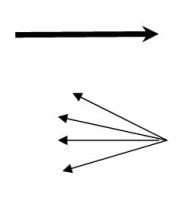WhatsApp completed 10 years last
year. WhatsApp has grown exponentially since its inception when it first seduced its users by changing the
way they communicate – instantaneous exchange of news while being able to talk to
each other – and all this at no cost. By 2011 the toddler WhatsApp had a record
of 1 billion messages per day propelled by the group chat feature. Today group
chat is the most widely used feature on WhatsApp and every user has at least
two to three groups on his or her phone today. The irresistible App had
its ups and downs but there can be no doubt that this one-to-one chat app
service developed by two former employees of Yahoo - Brian Acton and Jan Koum has become everyone’s “must-have”
accessory.
The Parable of the Mustard Seed is a well-known Buddhist folk tale. Kisa Gotami’s, only son died suddenly. She carried his young body from place to place pleading with people to help her bring him back to life. Their advice was to get an audience with the wise Buddha, who was capable of many miracles. Kisa visited Buddha and begged him to bring her dead son back to life.
Buddha
understood her grief and suggested that Kisa should collect some mustard seeds
from those in her neighbourhood in whose house/family there had never been a
death. With those mustard seeds, he assured her that he would be able to
concoct a medicine to revive her son back to life. She went back to her village
and began asking her neighbours for mustard seeds. Though all were ready to help
her by giving the mustard, they expressed their regret since all of them had
encountered death and they told her “the living are few but the dead are many”.
If Buddha had been alive today, He would have found it easier to say “Find me a family that does not have WhatsApp access and get me mustard seeds from that family”!
Jokes apart, it is a fact
of life that almost everyone, from the beggar on the street to the billionaire
in the Mansion, has Whatsapp on their phone. “WhatsApp was downloaded 96
million times in February 2020. WhatsApp is
available in more than 180 countries and 60 different languages. With 340million users, India is
the leader of the WhatsApp's market”, according to
Statistics.
Its popularity is because everyone is
aware of its advantages and the World literally revolves around it. Many people
are aware of its disadvantages – privacy issues, the onslaught of unavoidable
messages especially during festivals and special days, misinformation and its
addictiveness - there is, however, one major danger that it causes of which
very few are really aware of. While it can help to revive and maintain relationships,
it can also ruin relationships irrevocably.
In the days of snail mail, my father would say that we should be very careful while writing letters
because the mood in which you are writing the letter may be the opposite of the
mood in which the receiver would be when he is reading it and this may lead to
a lot of heartburn and problems. The same principle applies to WhatsApp also. In those days people could delay their reaction and
respond when they got out of their foul mood. With WhatsApp, however, the messages are instantaneous and people’s reactions are quicker too.
Senders Receiver
Imagine a scenario where a subordinate asks for
a salary raise or a girl is having doubts about her
relationship. He/she may have spent a lot of time in framing the message and
after much hesitation, he/she may send it with trepidation (may even have a
change of mind and want to cancel it but it is literally out of hand). Now the boss
or fiancé who receives it may be in a jovial, sad, angry or despondent mood or
may even be busy. It requires a lot of maturity for the receiver of the message, to
respond with “Let’s talk about this in person tomorrow”, no matter what the mood.
According to his/her mood, he/she may send back a joke, talk about his sorrow,
fire back a terse negative reply or not respond at all. This may
escalate out of control leading to the souring of a valuable relationship.
So it is always advisable to avoid the WhatsApp for professional communication especially of personal nature. Whenever you
want to start a serious discussion with anyone, remember that non-verbal cues
have a significant role to play in achieving what you want. WhatsApp does not
give you that opportunity so avoid it if you want to succeed!
As far as WhatsApp is concerned, it is
better to err on the side of caution because the words you send/message,
become the house you have to live in!






















